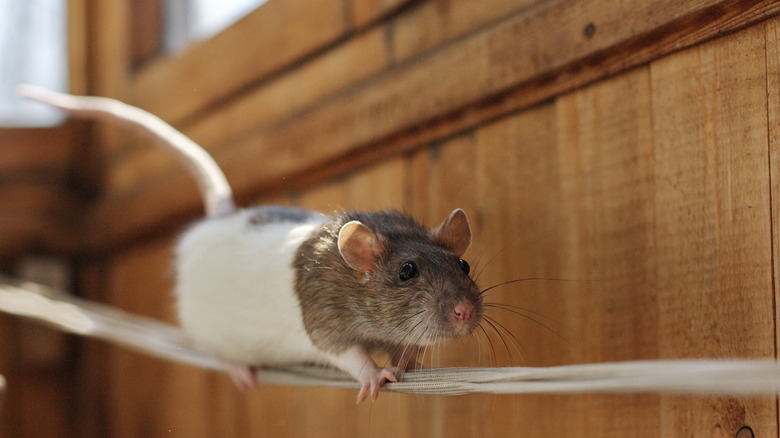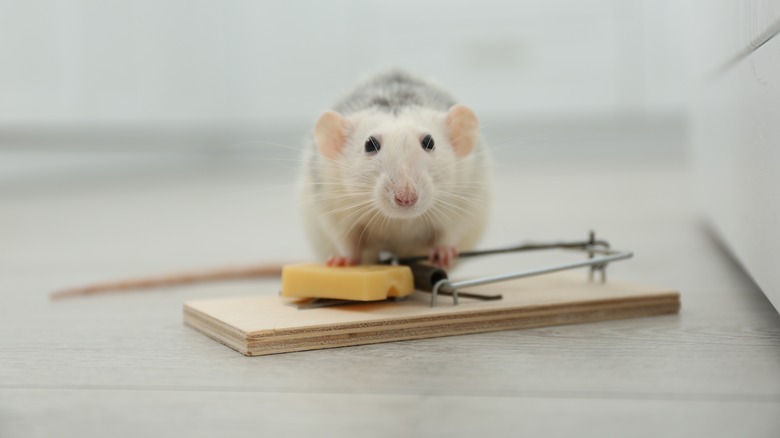Will Cinnamon Deter Rats From Your Attic? Here's What You Need To Know
Few things are quite as alarming to a homeowner as discovering rats are making a private oasis out of your attic. If you've noticed the telltale signs of rat droppings, gnaw marks on the floorboards, greasy residue, and nests, then there's a good chance these destructive rodents have already invaded your home. Once you get over the initial ick wave, you'll need to form a plan. Professional extermination can be costly and use toxic chemicals, while setting and disposing of your own traps can be a bit gross. So naturally, it makes sense to look for a natural alternative, and one of the most toted solutions uses a common culinary spice: cinnamon.
Cinnamon is thought to repel rats because of its strong scent, which is lovely enough to people but strong and overpowering to rats and their more sensitive olfactory systems. But does cinnamon actually keep rats out of the attic? It's thought that the strong smell can signal to rats that they should scurry elsewhere, but there are no strong scientific studies about this. Many stories of cinnamon's use in controlling rodent pests describe its deterring effects against mice, not rats. But seeing as cinnamon is natural, non-toxic, and affordable, and since there is still some anecdotal evidence that says that it can redirect rats away from your attic and home, it's worth trying.
Repel rats with this sweet spice
To use cinnamon to ward off rats, you'll need either cinnamon bark, ground cinnamon, or cinnamon essential oils. If you're using ground cinnamon or a cinnamon stick, place it in a sachet or ramekin, then stow it near any possible openings where rats may be entering the attic, such as gaps in flooring, baseboards, or windows. Going with essential oils is another solid choice, you'll just need to dilute the oil with some water in a spray bottle, then spritz the same openings mentioned above. Keep in mind that cinnamon essential oil can stain due to its natural pigmentation, so use it with caution around any upholstery or cherished items. The aromatic power of any of these cinnamon solutions will fade over time, so you'll need to swap your cinnamon source or reapply spray frequently if you're using this as a long-term measure. You can also soak cotton balls with cinnamon essential oil, a trick some DIY pest controllers do with vinegar.
It should also be noted that rats are very good at adapting their senses and may become nose-blind to the cinnamon. In that case, you may want to have a few other strongly scented spices in your arsenal. Cayenne pepper and peppermint essential oil could be thrown in intermittently to keep the rats at bay. While these solutions are all-natural, they should not be used if you have pets, as inhaling or ingesting them could be dangerous for your animal friends. If you have children but no pets, use caution when placing them, and be sure to put them out of the reach of any kids.
Use a multifaceted approach
As we said before, cinnamon is only a partial rodent control solution — you'll need to take other steps actually to eliminate the rodent population in your attic. You'll need to use a combination of traps and sealing off any entry points that rats may be entering the home through. Though these aren't quite as painless as placing a few cinnamon bundles around the attic, they are great ways to avoid using harsh, toxic pesticides.
You should also give the attic a thorough cleanup and sanitizing. Rats enter homes in search of food and shelter, and attics, thanks to mostly being used for storage, are the perfect zone to collect dust and house these rodents. After organizing everything in the attic and giving it a good wipe-down, sanitize it with your favorite solution. If you want to give the area a nice scent after cleaning that will also work to scare the rats away, use that cinnamon oil spray, or mix it with your preferred multipurpose cleaner. As a bonus, cinnamon deters wasps too, so this hack can work against a couple of attic infestations. If your cinnamon DIY fix doesn't work to deter those rodents, or if its effectiveness fades over time, consult an expert. Leaving a rat infestation untreated is a health hazard for you and your loved ones.


